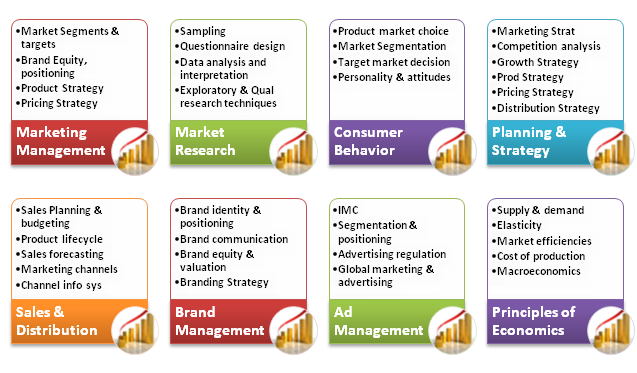

Featured AMCAT Module: Marketing
About the Module
The marketing module, based on the curriculum taught in 2 years of MBA, would help discriminate candidates who have only theoretical knowledge vis-a-vis someone who understands the theory as well as its application.
Marketing is a subject that requires one to probably have more real world knowledge and updates rather than theoretical knowledge. Basis the test, which is of 18 minutes duration and comprises of 27 questions, organizations would be able to identify candidates having a good understanding of all aspects of marketing ranging from fundamentals, market research, planning, strategy and principles of economics all of which are closely linked and would be required by a marketing professional.
The module tests the candidates on the following Marketing concepts:

Marketing management
It focuses on the practical application of marketing methods and the management of a firm's marketing activities. Rapidly emerging forces of globalization have led firms to market beyond the borders of their home countries, making international marketing highly significant and an integral part of a firm's marketing strategy. Marketing managers are responsible for influencing the composition, level and timing of customer demand.
Market research
It is the systematic gathering and interpretation of information about individuals or organizations using statistical and analytical methods of the applied social sciences to gain insight or to support decision making. It is a very important component of business strategy. It provides important information to identify and analyze the market need, market size and competition. It includes social and opinion research.
Consumer behavior
It is the study of when, why, how, and where people do or do not buy a product. It blends elements from psychology, sociology, social anthropology and economics. It attempts to understand the buyer’s decision making process, both individually and in groups. It studies characteristics of individual consumers such as demographics and behavioral variables in an attempt to understand people's wants. It also tries to assess influences on the consumer from groups such as family, friends, reference groups, and society in general.
Strategic planning
It is an organization's process of defining its strategy, or direction, and making decisions on allocating its resources to pursue this strategy. In order to determine the direction of the organization, it is necessary to understand its current position and the possible avenues through which it can pursue a particular course of action. Generally, strategic planning deals with at least one of three key questions:
- What do we do?
- For whom do we do it?
- How do we excel?
The key components of 'strategic planning' include an understanding of the firm's vision, mission, values and strategies.
Sales & Distribution
This aspect of marketing deals with the study of strategies to enhance the sales by effective channel management. For many companies, establishing the most appropriate distribution strategies is the key to success. There are different types of channels, from direct, to the web, to the traditional retail environment. For a particular type of firm, only a specific distribution strategy would work. Hence, it is important to make a wise choice of the strategy to be adopted, keeping in mind the market environment, internal constraints and legal considerations. Sales & distribution management is the lesser visible side of marketing, nevertheless a very important for the company to have a greater impact on the business.
Brand management
It means defining the brand, positioning the brand, and delivering the brand. Brand management is nothing but an art of creating and sustaining the brand. Branding makes customers committed to your business. A strong brand differentiates your products from the competitors. It gives a quality image to business.
Brand management includes managing the tangible and intangible characteristics of brand. In case of product brands, the tangibles include the product itself, pricing, packaging, etc. While in case of service brands, the tangibles include the customers’ experience. The intangibles include emotional connections with the product / service.
Advertising management
While advertising is the promotional campaign itself, advertising management can address the whole process - the function of marketing starting from market research continuing through advertising, leading to actual sales or achievement of objective, potentially including evaluation of the entire cost-benefits to the company involved.
Advertising management incorporates various specialized sub-functions like media strategy, message strategy, media planning, media buying etc. It involves designing the strategies to be adopted for influencing the public i.e. media selection and deciding on the aspect to be advertised based on the image of the company and the present marketing objective.
Principles of economics
Besides the above concepts the candidates are also tested on the basic economic principles like Supply & demand, Elasticity, Market efficiencies, Cost of production, Macroeconomics etc.
Tips to Improve
- Read business magazines and articles on marketing.
- Watch Business news channels to stay up-to-date about the latest trends in marketing.
- Solve case studies to learn about the types of real-time problems that many companies and industries encounter and how they win over such situations.
- Follow national and international news and use your theoretical concepts to predict impact of these changes
- Talk to a lot of marketing professionals and professors and take up small projects (even if as a volunteer) which will give you real world understanding




